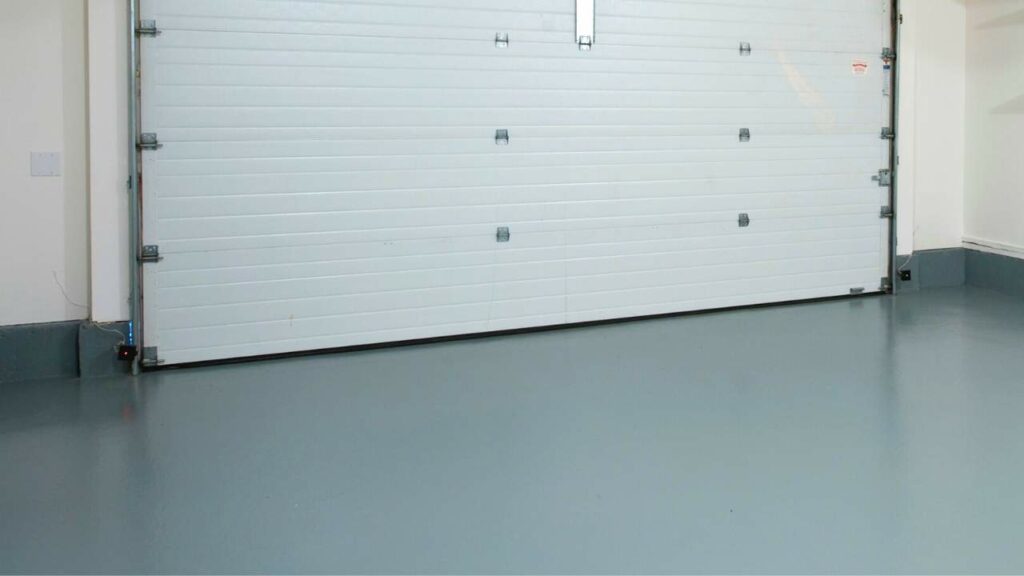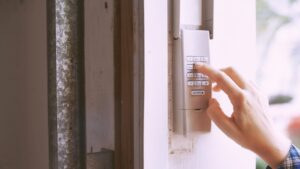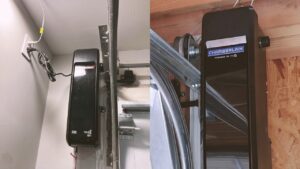“Should I epoxy my garage floor?” The simple answer is definitely YES!
When installed correctly, an epoxy coating can provide a highly durable flooring system that can last for decades. According to most flooring contractors, “heavy-duty” epoxy flooring is expected to last 20 to 30 years.
There are types of epoxy coatings specially formulated to handle harsh conditions. These epoxy coatings resist liquids, chemicals, abrasion, impact, and stains. An epoxy garage floor beats many other flooring options, such as tiles, polished concrete, and vinyl planks.
But not all epoxy coatings are created equal.
Despite all the positive reviews, there are still a lot of bad stories you can read from garage owners.
“I just installed my epoxy floor, but it quickly peeled off.”
“The hype is false! Don’t buy epoxy for your garage!”
“I don’t recommend it. It’s just a waste of money.”
Now, if you plan to apply epoxy to your garage floor, don’t be confused.
Some epoxy garage floors suffer from early deterioration for many reasons. And, of course, false information about epoxy coatings is still rampant in the industry.
So, read on to learn more about what you should consider before applying epoxy to your garage.
What is an Epoxy Floor?
An epoxy floor coating comes in two parts: a hardener and a resin.
When the two parts are mixed, a chemical reaction for hardening happens. It is applied on top of a concrete floor for protection and decoration. Once the epoxy coating cures, the flooring system establishes a permanent bond with the concrete substrate, and it transforms into a solid polymer system with exceptional toughness and chemical resistance.
NOTE: Epoxy coatings are different from epoxy paints. Epoxy paint is latex acrylic paint that contains only small amounts of epoxy. Therefore, it’s not as durable as epoxy coatings.
An epoxy floor’s properties vary based on the type of fillers, curing agents, solvents, and resin used.
Pro Tip: The amount of load and traffic in a garage should be considered when choosing the type of epoxy floor coating. Consult a professional to ensure that your epoxy garage floor will last.
What are the Pros and Cons of an Epoxy Garage Floor?
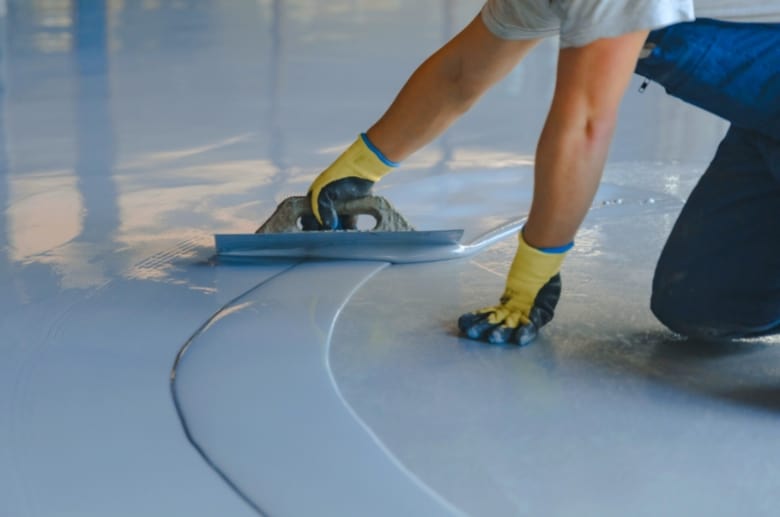
Epoxy garage floors have received overwhelmingly positive reviews. And quite understandably, they became a default option for many garage owners in recent years.
However, there are still some downsides to this type of flooring system.
For some garage owners, the price of 100% solid epoxy coatings is the biggest issue. The average cost of 100% solid epoxy ranges from $45 to $150 per gallon.
Another factor that should be considered is the tendency of epoxy floors to become yellowish and break down when exposed to UV radiation. Therefore, it’s not recommended for garages frequently exposed to direct sunlight.
Installation is also a turnoff for some DIYers because it requires specific tools or kits. And, even with the use of DIY epoxy floor kits, it’s hard to install correctly, requiring a tedious surface preparation process.
PRO TIP: Don’t waste your time and money. Hiring a professional epoxy floor installer is better to avoid common problems such as blistering, bubble formation, and delamination.
On the other hand, the benefits of using an epoxy garage floor outweigh the disadvantages.
Garages are constantly exposed to heavy loads, abrasion, and impact. Therefore, durability is the most significant advantage of having an epoxy garage floor. An epoxy garage floor is resistant to stains, water, chemicals, and other liquids.
With these features, you won’t have to worry about regular maintenance. This is especially beneficial for garage areas also used as leisure activities venues.
Resistance to abrasion and impact is another significant advantage you can get from an epoxy garage floor. It cannot be easily damaged by car tires, tools, equipment, or foot traffic because of its highly abrasion-resistant, rigid surface.
In summary, here are the pros and cons of having an epoxy garage floor:
PROS
- Highly durable and long-lasting
- Can withstand impacts, heavy loads, and traffic
- Resistant to chemicals, such as solvents, oils, and acids
- Relatively more hygienic than other flooring options
- Easy to maintain because it’s seamless and resistant to stains
Cons
- Not recommended for garages exposed to sunlight
- Requires a smooth concrete substrate
- Cracks and imperfections on the substrate should be repaired before application
- It can be costly compared to its counterparts
- Prone to application errors; not recommended for DIYers
Connect With A Garage Expert
Connect with local experts, Compare quotes, Get the best price.
Is Epoxy Flooring a Worthy Investment?
Considering an epoxy garage floor’s durability and longevity, it’s a worthy investment.
It doesn’t easily suffer from wear and tear, and the seamless finish helps keep you hygienic and well-maintained. Furthermore, damaged parts can be easily repaired by patching a new layer of an epoxy coating.
This means not renovating your floor after just two to five years. For these reasons, an epoxy garage floor is one of today’s most cost-efficient flooring options.
On the other hand, you should be careful when buying the epoxy coating you will use in your garage. As discussed earlier, epoxy floor coatings vary in price based on their quality, thickness, and durability.
Depending on the type of traffic, different types of epoxy floor coatings are recommended for different settings. As such, epoxy coatings for concrete come in three “formulations” that provide varying degrees of durability:
1. Water-Based Epoxy
Water-based epoxy floor coating is the cheapest option of the three. It is less viscous and easier to spread. The drawback is that it wears off quickly, requiring reapplication every two to three years. Therefore, water-based epoxy floor coatings are only recommended for garages exposed to less frequent traffic or loads.
2. Solvent-Based Epoxy
If you need something more robust than a water-based epoxy coating, consider upgrading to solvent-based epoxy coatings with 70% to 80% solids. The precent of solids describes the amount of solvent used in the formulation of the epoxy floor coating. For example, a 70% solid epoxy may contain 10% fillers and 20% solvents. This type of epoxy floor coating is recommended for medium-traffic areas.
3. 100% Solids Epoxy
An epoxy floor coating with 100% pure solids is today’s strongest and most expensive option. It can withstand chemicals, impacts, scratches, liquids, and stains. It is highly viscous and harder to apply. Therefore, applying a 100% solid epoxy coating requires professional knowledge and expertise.
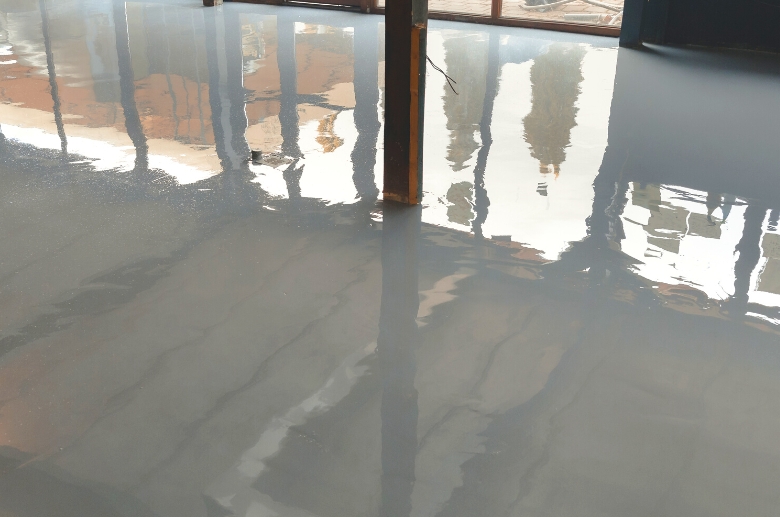
How Much Would It Cost To Coat Your Garage Floor with Epoxy?
Most homeowners will spend about $2,200 when they hire a professional epoxy floor installer for a 2-car garage. Including labor and supplies, the total cost to cover an existing concrete floor may be anywhere from $3 to $7 per square foot.
How many layers you want to add, what kind of epoxy you want to use, and the current state of the concrete slab, before you start, will all affect the final cost.
The cost of installing an epoxy coating on a garage will vary based on your epoxy type. Water-based epoxy is the cheapest at $30 to $50 a gallon. At about $45 per gallon, solvent-based epoxy falls in the middle of the price spectrum. The most costly material is 100% solids epoxy, which may cost up to $150 per gallon.
On average, you can get some ideas on how much an epoxy floor installation will cost based on the size of your garage:
| GARAGE SIZE | SQUARE FEET | AVERAGE COST |
| Single Car Garage | 264 | $792 – $1,848 |
| Double Car Garage | 440 | $1,320 – $3,080 |
| Three Car Garage | 704 | $2,112 – $4,928 |
Can I Epoxy my Garage Floor Myself?
It’s a case-by-case type of scenario. But, to keep the answer simple.
It depends on the amount of knowledge and skills you have when it comes to installing an epoxy garage floor. The amount of time and labor you’re willing to commit should also be considered.
Doing it yourself comes with benefits, and you can save on high costs if you can do it yourself.
However, such benefits can quickly backfire because the wrong installation will inevitably lead to defects and early deterioration. And then it’s back to square one.
NOTE: Most epoxy flooring kits available on the market tend to be thinner than the standard products used by flooring contractors. Therefore, they are less durable and less resistant to load, impact, and abrasion.
Connect With A Garage Expert
Connect with local experts, Compare quotes, Get the best price.
Can You Epoxy Over Concrete?
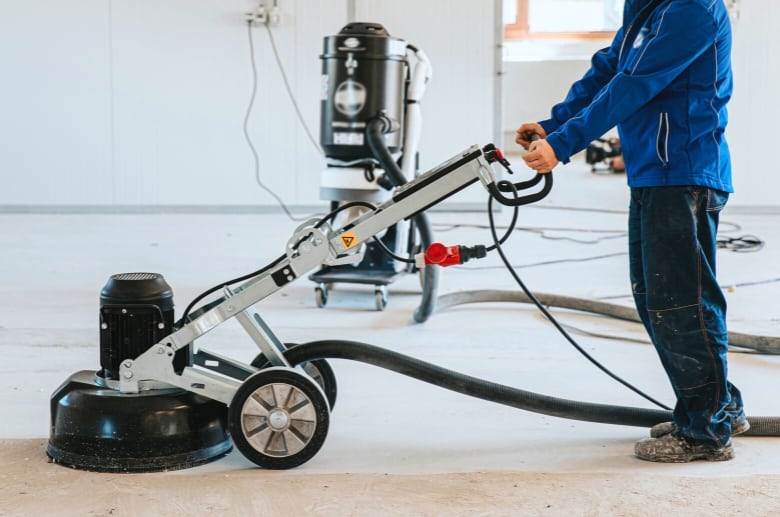
Yes, applying epoxy floor coating over a bare concrete slab is recommended. However, it is important to smoothen the concrete surface before applying the epoxy coating.
Substantial defects, such as dusting, scaling, spalling, and cracks, should all be repaired before the application process. Otherwise, the imperfections will soon appear on the finished floor.
NOTE: Concrete resurfacing costs around $3 to $7 per square foot. For an average 500-square-foot garage, you’re looking at around $2,500. But you can bring down the cost to $300 by doing it yourself.
When should you not use epoxy?
Why not Use Epoxy on the Garage Floor?
Despite the excellent reputation of epoxy garage floors, there are still reasons why it’s not for everyone. Suppose you’re still in the consideration phase. In that case, it’s essential to consider these factors carefully:
1. Budget and Requirement Mismatch
Depending on the traffic and load your garage is exposed to, the correct type of epoxy floor coating should be used. If there’s a “mismatch” between your budget and the required style of epoxy floor coating, it’s better to resort to cheaper flooring types in the market.
2. Garages Exposed to Sunlight
Epoxy will fade or become yellowish when exposed to UV radiation. Therefore, it’s not recommended for garages that are indirectly or directly exposed to sunlight. Note that “exposure” means constantly or regularly being exposed to sunlight during the day.
3. Areas With High Moisture or Humidity
Blistering is one of the most common defects of an epoxy floor. It happens when moisture underneath the substrate rises, pushing the coating upward.
NOTE: Blistering can be prevented by using a 100% solids epoxy primer.
In addition, an epoxy coating cannot bond well with a damp concrete floor. This is why new slabs should be cured for at least 28 days before applying any coating.
Therefore, epoxy coatings shouldn’t be used in a basement without a proper waterproofing system installed. The curing process is also affected by extreme garage humidity and temperature, which cause the formation of bubbles and other defects.
4. Rush Jobs and Time Constraints
Most epoxy coatings must cure for at least five days before being opened to traffic.
This is a significant disadvantage for time-sensitive projects, such as commercial establishments that can’t afford to stop their operations for too long. Installing an epoxy garage floor might not be a good idea if you rush to remodel your house.
Should I Epoxy My Garage Floor: The Answer
In summary, the answer to the question “Should I Epoxy My Garage Floor” is YES!
An epoxy coating is one of the most durable and long-lasting flooring systems. An epoxy floor coating with 100% solids is guaranteed to last 10 to 20 years when appropriately installed. Even its cheaper counterparts can provide high value when used correctly.
So, despite its enormous price tag, an epoxy garage floor is considered a cost-efficient investment.
On the other hand, there are still many things you should consider before calling a professional or doing it yourself.
If you’re still undecided, you can read more blogs regarding this topic on our website. You can also give us a call or request a quote so that we can assist you further.
As one of the most trusted garage flooring experts, we have a network of professional flooring contractors that can help you every step of the way.

